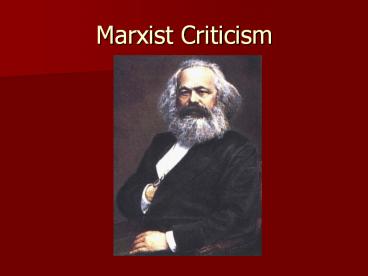Marxist Criticism - PowerPoint PPT Presentation
1 / 9
Title:
Marxist Criticism
Description:
Often called the father of communism, Marx was both a scholar and a political activist. ... and totalitarian order through laughter, parody, and grotesque realism ... – PowerPoint PPT presentation
Number of Views:780
Avg rating:3.0/5.0
Title: Marxist Criticism
1
Marxist Criticism
2
Who is Karl Marx?
- He was a 19th-century philosopher, political
economist, sociologist, humanist, political
theorist and revolutionary. Often called the
father of communism, Marx was both a scholar and
a political activist. - He was concerned particularly with the effect of
the economy upon human life. - He is the author of The Communist Manifesto.
3
The Gist of the Theory
- All society revolves around economic conditions.
- No human exists on a social island.
- A person, according to Marxists, is a product of
his or her economic conditions.
4
Key Terms
- Class refers to the economic group to which one
belongs - Class conflict disputes between different
classes (i.e. industrial working class v. the
owners of production) - Ideology ideas, beliefs, forms, and values of
the ruling class that circulate through all the
cultural spheres
5
Key Terms Contd
- Hegemony force that designates the continuous
ideological domination of the ruling class over
all other classes through nonviolent means (i.e.
church, school, family, media, arts, trade
unions, etc.) - Commodity a good or service produced primarily
for monetary exchange and profit - Carnivalesque forms of unofficial culture that
resist official culture, political oppression,
and totalitarian order through laughter, parody,
and grotesque realism
6
Marxism and Literature
- Literature reflects the social institutions that
produce it. - It is itself a social institution and has a
particular ideological function. - Literature reflects class struggle and
materialism. - Literary works are themselves products of their
respective eras.
7
Questions a Marxist Critic Asks
- What role does class play in the work what is
the author's analysis of class relations? - How do characters overcome oppression?
- In what ways does the work serve as propaganda
for the status quo or does it try to undermine
it? - What does the work say about oppression or are
social conflicts ignored or blamed elsewhere? - Does the work propose some form of utopian vision
as a solution to the problems encountered in the
work?
8
Ideas to Keep in Mind
- How power is distributed in the work
- The function of and concern with wealth within
the work - The ways the characters express their own
socioeconomic class - The socioeconomic class of the author and the
time period in which he or she wrote - The way the work supports or refutes the hegemony
(ruling force).
9
Apply It
- Think of two major ideological influences in our
society and use the Marxist approach to discuss
their impact upon our thinking.































